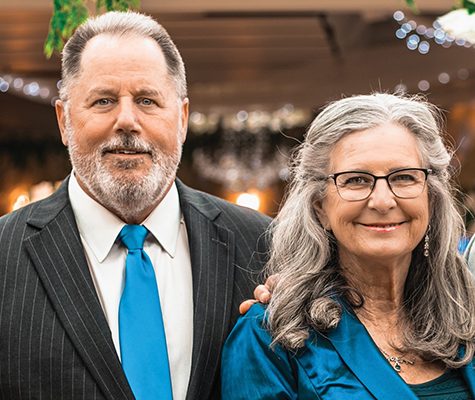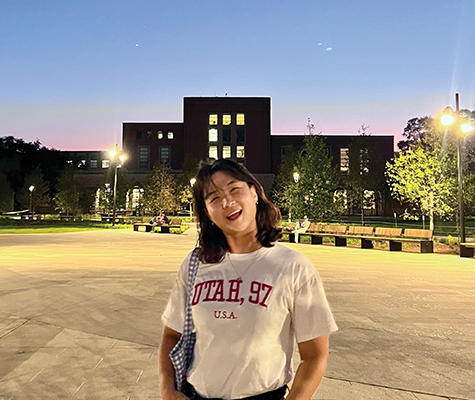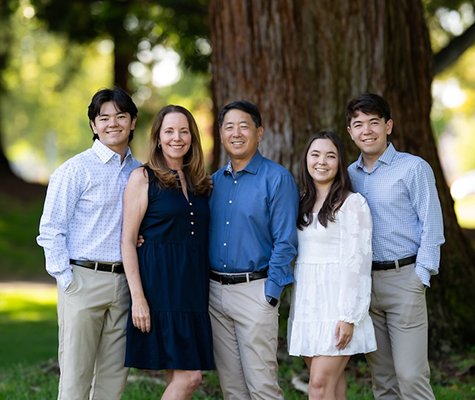Biotech Launch Pad Fellows:
Meet the team of scientists revolutionizing health care solutions.

The labs at the BioScience Research Collaborative are just what you would imagine a medical research space to be — a labyrinth of workstations, refrigerators, centrifuges and microscopes. The work going on inside, however, is anything but ordinary. The Biotech Launch Pad Fellows, a group of four promising young scientists, are pioneering medical breakthroughs in women’s health and proposing solutions to pervasive problems that have largely gone unnoticed by decision-makers in board rooms or venture capital firms — and working to get their solutions to market within five years.
The Biotech Launch Pad Fellows are disrupting the traditionally slow and circuitous pathway from academic research to commercialization. Rather than navigating the difficulties in publishing and funding as individual scientists, they are participating in a large-scale initiative, Rice’s Biotech Launch Pad — an initiative designed to efficiently advance the university’s health and medical technology discoveries into clinical studies and commercialization.
“We are inventing the future of medicine — a future that is transformed by considering scalability and cost at the earliest stages of innovation,” explained Omid Veiseh, professor of bioengineering and the faculty director of the Biotech Launch Pad.
Omid is mentoring the first cohort of the Biotech Launch Pad Fellows, sharing his comprehensive vision to bridge the gap between laboratory research and its practical application in clinical settings. Omid’s strategy begins with clinicians — talking to them and identifying needs. “From there you are designing the clinical trial,” Omid said. “You’re designing manufacturing. You're designing regulatory strategy, a patent, an investigational product strategy. We can do this in five-year cycles. Normally it could take up to 12. This is going to increase impact and attract top-tier talent to Rice.”
Omid is sharing his extensive expertise with the Biotech Launch Pad Fellows, guiding their research efforts to ensure solutions are brought to market. Read the following stories to see just how these talented scientists are working to solve intractable problems in women’s health care.
Scroll down to read more or jump to the stories below
Martha Fowler ’24 | Alisha Menon | Samira Aghlara-Fotovat ’25 and
Samantha Fleury ’25

The Scientist: Martha Fowler ’24
Ph.D. Candidate in Bioengineering
Veiseh Research Group
The Challenge: Lymphedema
Occurring in nearly 40% of breast cancer survivors, lymphedema is a painful condition that occurs when lymph nodes are removed and the body’s plumbing is disrupted. With essential elements of the lymphatic system removed, the body cannot properly dispose of excess fluid and waste. The result is swelling, infection and even disfigurement. There is no cure for lymphedema. The symptoms are managed through lymphatic massage, bandaging, compression garments or a costly and invasive surgery to transfer lymph nodes from other areas of the body.
The Solution:
At Rice, Martha Fowler ’24, a doctoral student in Omid’s bioengineering lab, has been working on a new biomaterial that will initiate lymphatic regeneration — an idea that caught the attention of clinicians at MD Anderson Cancer Center as a possible treatment for lymphedema.
Martha’s solution proposes a cell therapy platform, delivered via hydrogel, that recruits and regrows lymphatic vessels, routing them toward healthy lymph nodes. The hydrogel is placed just under the skin in a minimally invasive procedure.
“In wound healing, blood vessels regrow, bringing needed nutrients to the site,” Fowler explained. “But once those vessels bring cells to that area, only the lymphatic system can carry away the waste, which is an important part of the body’s immune response. We are using a cell therapy platform that produces a factor to regenerate and direct lymph vessels.”
Martha is expecting her product to reach clinical trials by 2026. Along the way, Omid and his team are consulting on safety and efficacy, manufacturing, and initial meetings with the FDA to help guide trial strategies.

“Lymphedema is a disease that no one is really paying attention to. We have a biomaterial that can initiate and guide vascularization within a couple of weeks. It’s exciting work.”
—Martha Fowler '24

The Scientist: Alisha Menon
Postdoctoral associate
Robinson Lab
The Challenge: ICU-Grade Wearable Sensors for a Wire-Free NICU
Babies in the neonatal intensive care unit (NICU) spend the majority of their time in incubators, connected by a jumble of wires to key sensors that track vital signs. The wires surrounding these tiny babies make picking up the baby difficult and act as a deterrent to bonding time, which is important for temperature management, as well as brain and social development. The wires also interfere with essential care routines, doubling the amount of time nurses spend changing diapers, bathing and feeding the baby.
The Solution:
The partnership between Rice and TMC has given Alisha Menon, a postdoctoral researcher, the opportunity to shadow nurses in the NICU and to fully conceptualize the processes involved in caring for and monitoring premature babies.
Alisha is developing a completely wireless monitoring system for the NICU, replacing the three-lead ECG that picks up respiratory rate, temperature, heart rate and blood oxygenation levels. “Adapting wearable technology for the NICU produces significant design challenges that remote monitoring applications don't face. We have to provide ICU-grade sensor data and constantly stream at high resolution to hospital monitors, all without increasing sensor surface area to avoid additional stress on fragile neonatal skin,” Alisha explained. “ECG is typically sampled at approximately 200 hertz in a remote setting and stored locally on the device for later upload. The NICU requires 500Hz, and nurses need access to the data in real time. If you want to collect and transmit that quality of data on a wearable sensor without significantly changing device size or weight, you need to think very carefully about how you are going to manage your battery life.”
Alisha’s version two prototype is about 3 inches in diameter, but the goal for version three is to make the device the size of a quarter. Her goal is to start studies on 10-20 patients this fall, with the goal of demonstrating equivalency between her system and the wired system currently used in the NICU.

"Adapting wearable technology for the NICU produces significant design challenges that remote monitoring applications don't face"
—Alisha Menon

The Scientists:
Samira Aghlara-Fotovat ’24
Samantha Fleury ’25
Ph.D. candidates in Bioengineering
Veiseh Research Group
The Challenge: Endometriosis
It is estimated that 10% of women suffer from endometriosis, a condition where the lining of the uterus grows in other parts of the body, resulting in inflammation and lesions. Endometriosis makes conception difficult and causes monthly, if not daily, pain that interferes with quality of life. “It’s clear from patient stories and talking to clinicians that there is a huge unmet need to treat endometriosis. One of the big challenges of working in the women’s health space is that historic and chronic underfunding has left us with only a rudimentary understanding of the disease and its causes,” explained Samantha Fleury ’25. The current literature and standard of care is based on treating the disease through hormonal regulation. “When that fails surgery is the only option,” said Samira Aghlara-Fotovat ’24, Samantha’s research partner. "Physicians are heartbroken that they have nothing to offer, and patients are suffering.”
The Solution:
The Veiseh lab works extensively on the idea of a cell-based cytokine factory that produces a pro-inflammatory response in order to kickstart the immune system to attack cancer cells. Conceptually, the same platform can be manipulated to treat an inflammatory disease, like endometriosis, by doing the opposite — turning off the immune system.
“You engineer the cells to produce the therapeutic (designed to turn off the immune response), and then you encapsulate those cells in hydrogel and deliver them to the peritoneal cavity, where the majority of the disease is found,” Samantha described. “We envision this treatment being used in a patient who is undergoing a laparoscopic procedure where the lesions are being excised — that way you are preventing any additional lesions from forming.”
Samira and Samantha are intent on their product going to market within five years. “We are lucky to be following behind other projects from Omid’s lab,” Samantha said. “The general idea of encapsulated cell therapy has been brought to clinical trials already, which shows us the pathway forward.”

"It’s clear from patient stories and talking to clinicians that there is a huge unmet need to treat endometriosis."
— Samantha Fleury '25
Accelerate the Vision
The Biotech Launch Pad Fellows are working to address urgent health care challenges. To learn more about supporting these dynamic scientists, contact Sara L. Rice, executive director of development, at sdl@rice.edu or 713-348-3189.






